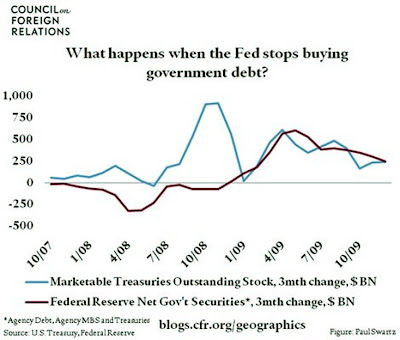
"Investors should bet on a rise in long-term U.S. Treasury yields, which move inversely to prices, as long as Bernanke and White House economic adviser Lawrence Summers are in office..."
Directionally correct we would say, but it is certainly a
contrarian view today, with Treasuries and the dollar acting again as the safe havens of choice as fears of US jobs losses and Eurozone sovereign defaults frighten the markets.
Keep in mind that his
time frame is '2 to 3 years.' Most punters do not realize that funds and specs hold record long positions in the dollar according to the latest Commitments of Traders Reports. Treasuries were a strong performer last year, and may be overbought relative to underlying fundamentals. But one repeatedly hears the meme "Everyone is short the dollar." And dollar debt is not a short, if one has the option of default.
But it will take the appearance of the effects of the ongoing monetization of debt by the Fed and the government agencies and Treasury programs that Taleb cites to trigger the declines in the bond and the dollar. And the euro and the pound may go first, to cushion the blow. Everything is relative, and the US banks will throw their relatives, their
European cousins, under the bus if it is required to save their bonuses. The saying "he would sell his mother for an eighth" is a Wall Street proverb.
With a fiat currency regime, one always has to say, "it depends..."
And China is looking a bit bubbly as well, although the Chinese bank is acting to try and stem the speculation. It may not be enough.
Bloomberg
Taleb Says ‘Every Human’ Should Short U.S. TreasuriesFebruary 04, 2010, 11:01 AM EST
By Michael Patterson and Cordell
EddingsFeb. 4 (
Bloomberg) --
Nassim Nicholas
Taleb, author of “The Black Swan,” said “every single human being” should bet U.S. Treasury bonds will decline, citing the policies of Federal Reserve Chairman Ben S.
Bernanke and the Obama administration.
It’s “a no brainer” to sell short Treasuries,
Taleb, a principal at
Universa Investments LP in Santa Monica, California, said at a conference in Moscow today. “Every single human being should have that trade.”
Taleb said
investors should bet on a rise in long-term U.S. Treasury yields, which move inversely to prices, as long as Bernanke and White House economic adviser Lawrence Summers are in office, without being more specific.
Nouriel Roubini, the New York University professor who predicted the credit crisis, also said at the conference that
the U.S. dollar will weaken against Asian and “commodity” currencies such as the Brazilian real over the next two or three years.
The Fed and U.S. agencies have lent, spent or guaranteed $9.66 trillion to lift the economy from the worst recession since the Great Depression, according to data compiled by
Bloomberg.
Bernanke, who in December 2008 slashed the central bank’s target rate for overnight loans between banks to virtually zero, flooded the economy with more than $1 trillion in the largest monetary expansion in U.S. history.
In a short sale, an investor borrows a security and sells it, expecting to profit from a decline by repurchasing it later at a lower price.
“Dynamite in the Hands of Children”President Barack Obama has increased the U.S. marketable debt to a record $7.27 trillion as he tries to sustain the recovery from last year’s recession. The Obama administration projects the U.S. budget deficit will rise to a record $1.6 trillion in the 2011 fiscal year.
“Deficits are like putting dynamite in the hands of children,”
Taleb said in an interview with
Bloomberg Television. “They can get out of control very quickly.”
Taleb argued in
“The Black Swan: The Impact of the Highly Improbable” that history is littered with rare events that can’t be predicted by trends. The best-selling book came out in 2007 before the global credit crisis sparked an economic slump and $1.7 trillion of losses at banks and financial institutions.
“
The problem we have in the United States, the level of debt is still very high and being converted to government debt,”
Taleb said in an interview with
Bloomberg Television. “
We are worse-off today than we were last year. In the United States and in Europe, you have fewer people employed and a larger amount of debt.”
Credit OutlookMoody’s Investors Service Inc. said on Feb. 2 that
the U.S. government’s Aaa bond rating will come under pressure in the future unless additional measures are taken to reduce budget deficits projected for the next decade.
Treasuries soared during the financial crisis, gaining 14 percent in 2008, as investors sought the relative safety of U.S. government debt. They fell 3.7 percent last year, according to Bank of America Corp.’s Merrill Lynch Unit, as risk aversion eased and the Standard & Poor’s 500 Index rallied 23 percent. So far this year U.S. government debt has gained 1.17 percent.
Yields fell today on concern European countries including Greece, Portugal and Spain face difficulty financing budget deficits. The yield on the benchmark 10-year note fell 6 basis points, or 0.06 percentage point, to 3.64 percent at 10:54 a.m. in New York, according to
BGCantor Market Data.
“Democracies can’t handle austerity measures very well,”
Taleb added. “We’re going to have a severe problem.”
"The Federal Reserve plans to stop buying securities issued by government housing loan agencies Fannie Mae and Freddie Mac by the end of the first quarter.



































